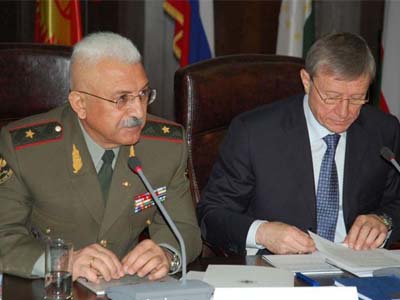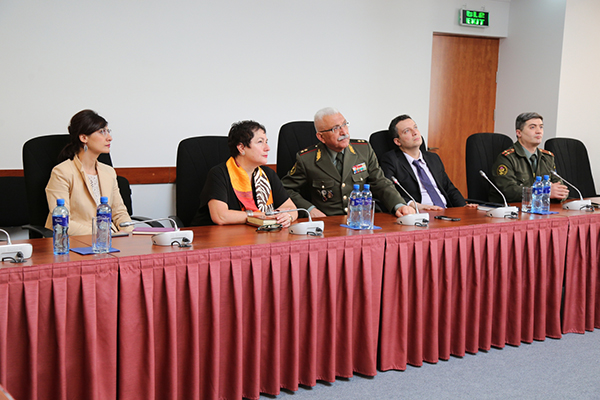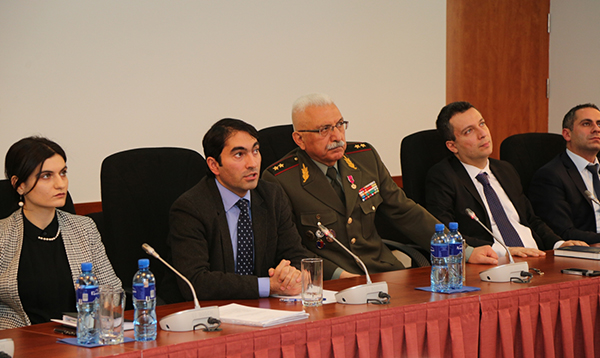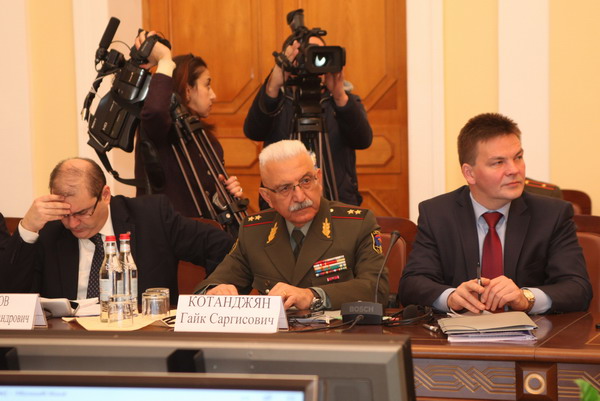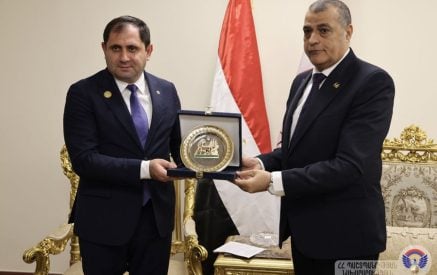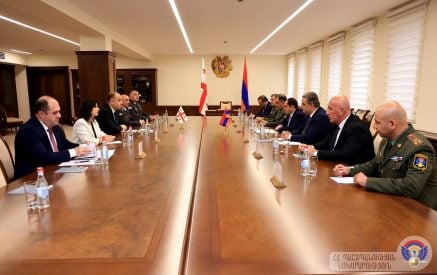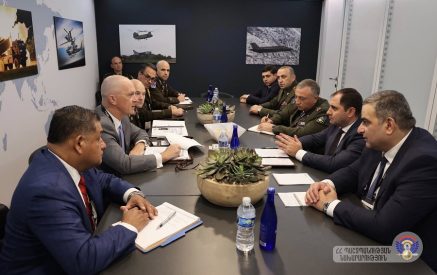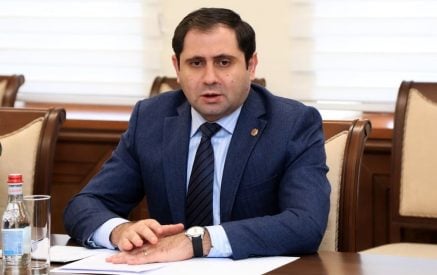As we have reported, on June 26-27, Yerevan hosted the Second Strategic Policy Forum “POLITICAL AND SECURITY GUIDELINES FOR THE FORMATION OF THE CSTO’S MILITARY COMPONENT” organized by the Institute for National Strategic Studies MOD, Armenia (INSS), the Secretariat of the CSTO and the independent non-profit organization “Institute of the CSTO”. It should be noted that the Forum was attended by both the specialists of the CSTO member states and the representatives from the OSCE Minsk Group Co-chair states (Russia, the US and France), as well as from international organizations accredited to Yerevan. The President of Armenia Serzh Sargsyan welcomed the Forum.
Praising the success of the Forum, the CSTO Secretary General Nikolai Bordyuzha suggested to establish the Annual Strategic Policy Forum on the basis of the INSS, MOD, Armenia grounded on the experience of conducting academic and expert forums on the most topical issues of the Organization’s development. It is proposed to extend the participation format of the Forum to an international level ‒ involving all the parties interested in the strengthening of the collective security in the context of the overall interests of maintaining peace, stability and global security.
Here is the presentation of one of the key organizers of the Second Strategic Policy Forum ‒ Doctor of Political Science (Russia), Counterterrorism Fellow (the US), Head of the INSS, MOD, Armenia, Major-General Hayk Kotanjian on the topic “PEACEKEEPING AS AN IMPORTANT PART OF THE CSTO’S MILITARY COMPONENT: PLACE AND ROLE OF ARMENIA”.
Read also
It is well known, that peacekeeping activities are crucial in preventing and settling armed conflicts, and involvement of individual countries or international organizations in peacekeeping processes significantly raises their profile, promotes national and collective interests within the international community, strengthens their military and political positions in the system of international security.
Realizing the importance of peacekeeping in ensuring international security and stability the Collective Security Treaty Organization (CSTO) consistently increases the normative-regulatory framework for coordinating its activities in this area. As we know, on October 6, 2007 the “Agreement on peacekeeping activities of the Collective Security Treaty Organization” was signed in Dushanbe, which came into force in January 2009[1].
According to Article 2 of the Agreement, the establishment of peacekeeping forces – acting on a permanent basis – is envisaged for the participation in peacekeeping operations. For the acquisition of peacekeeping forces the states parties – in accordance with their national law – are prescribed to allocate peacekeeping contingents. In fact, the establishment of a permanent peacekeeping collective military formation is envisaged within the confines of a collective security organization that is still unprecedented in international practice. Today no international organization has peacekeeping forces acting on a permanent basis. For example, the UN has a system of the so-called “stand-by arrangements”. Thus, the CSTO may become the first international organization that will have “blue helmets” constantly ready for action[2].
Although more than four years have passed since the Agreement entered into force, and during that time within the framework of the Organization a political and legal basis for the formation and use of peacekeeping forces has been successively developing – Methodical guidelines were worked out for the training of peacekeeping troops – the CSTO’s peacekeeping activities in comparison with those of the UN, NATO and the EU aimed at resolving conflicts remain quite passive. It should be mentioned, that the cooperation of the Organization’s member states in the field of peacekeeping still does not extend beyond joint exercises. In the fall of 2012, Kazakhstan hosted the first exercises of the CSTO member states’ peacekeeping forces “Unbreakable brotherhood-2012”, and the following exercises are to be held in October 2013 in Russia[3].
According to Article 3 of the abovementioned Agreement, the decision to conduct a peacekeeping operation in the territory of the member states is made by the Collective Security Council (CSC), taking into account their national legislation, on the basis of an official request of a member state to conduct peacekeeping operations in its territory or by the decision of the UN Security Council to conduct a peacekeeping operation in the territory of non-CSTO member states.
Thus, although the mechanisms of peacekeeping operations in the Organization’s zone of responsibility and beyond are normatively identified, in fact, the CSTO is not able to implement certain activities in this direction yet.
Meanwhile, the Agreement and other basic documents on the CSTO’s peacekeeping activities will have a real practical significance only if the CSTO takes the initiative to be integrated into the international security processes of conflict settlement in the “hot spots” of our planet.
The implementation of peacekeeping operations in the territory of the Organization’s member states from the political point of view appears to be problematic only because of possible assessments of goal setting and substance of operations. In other words, we are talking about the guarantees to distance the peacekeeping within the CSTO from punitive functions. As for political and legal competence of such operations – for their implementation the Article 3 requires only a decision of the CSTO’s Collective Security Council, and the UN mandate is not compulsory.
Perhaps at an early stage of implementing its legal and regulatory basis the CSTO should focus on peacekeeping operations beyond its zone of responsibility, after the example of NATO strengthening the cooperation with the UN and providing peacekeeping contingents for its missions. The “Memorandum of Understanding between the UN Department of Peacekeeping Operations and the Secretariat of the Collective Security Treaty Organization”[4] signed last year could serve as a basis for such cooperation. As we have already noted, the participation in peacekeeping operations under the UN mandate would substantially increase the prestige of the corresponding CSTO in the field of international security[5].
From the organizational and practical perspective, the questions about the representation format of the states parties in the CSTO’s permanent collective peacekeeping brigade, the development of its final structure have to be discussed, taking into account the resources and some other features of the represented countries that is connected with the need for additional consultations at the level of Heads of States of the CSTO.
At the same time, there is another option for the participation of the CSTO in peacekeeping missions. According to Article 8 of the Agreement, the CSTO may conclude collective stand-by arrangements with the UN, and each member state having such an arrangement may participate in joint peacekeeping operations of the Organization under the UN mandate or under the auspices of corresponding regional organizations, in the latter case after informing the Collective Security Council.
This practice is widely used in international relations. For example, NATO under the UN mandate is actively involved in peacekeeping operations in different continents of the world. According to this practice, the CSTO can also take responsibility for conducting peacekeeping operations. Individual countries have the right to conclude framework agreements with the CSTO, and perform peacekeeping operations under the command of one of the members of the Organization authorized to coordinate the mission.
For the development of the peacekeeping institute within the framework of the CSTO it is important to build new relations with NATO – a highly experienced actor that has a well-established key role in the system of global security. Joint peacekeeping operations involving the individual member states of the Alliance and the CSTO could be one of the initial platforms on which it will be possible to generate a fruitful cooperation. In this sense, the organization of joint peacekeeping activities in conflict regions where the interests of the two organizations are the same seems expedient.
In connection with the establishment of relations with NATO, the emerging recent trends of the CSTO’s revitalization in the Central Asian region are noteworthy. Inside the CSTO there is a dominating view that after the withdrawal of coalition troops from Afghanistan, the situation in the countries of the region will worsen[6], and there can be a threat to the security of Central Asia and the CSTO as a whole. In this regard, during the CSTO Council meeting in Moscow on November 17, 2011, the CSTO’s Action Plan Project was agreed on the neutralization of potential challenges and threats coming from Afghanistan[7].
In December 2011, as a participant of the Afghan war I had a chance to speak at the special meeting of the Academic-Expert Council of the CSTO on Afghanistan. Recently I had the opportunity to participate in the discussion of this important issue organized by the CSTO Analytical Association in Bishkek. In my opinion, the interest in peacekeeping cooperation shown by the American experts from the Harvard University National Security Program is worthy of attention. The promotion of a dialogue on the fight against threats from Afghanistan after the withdrawal of coalition forces seems promising not only in the format of “Russia-US”, but also “US-CSTO” or “6+1” – commensurate with the parallel partnership in the format of “NATO-Russia” or “28+1”. The emerging trend of the renewal of the dialogue between the President of the Russian Federation Mr. Vladimir Putin and the US President Mr. Barack Obama on finding solutions to the global security problems can contribute to this endeavour.
From the point of view of supporting this dialogue and establishing the cooperation in the field of international peacekeeping among the states and organizations Armenia can play a certain role being Russia’s strategic ally and the partner of the United States, as well as a founding member of the CSTO and partner of NATO, having extensive experience in peacekeeping operations conducted by coalition forces of the Alliance and the forces of partner states, as well as in the exercises of the CSTO within the operating Collective Rapid Reaction Force.
Since 2004, Armenia has participated in the NATO-led Peacekeeping Force in Kosovo. In 2005-2008, the Armenian peacekeepers have also gained useful experience participating in the US-led peacekeeping coalition in Iraq. Since 2009, Armenia has contributed to the peacekeeping mission of the International Security Assistance Force in Afghanistan.
The recent official appeal of Italy – the country-commander that implements UNIFIL peacekeeping mission in Lebanon under the auspices of the UN – with a proposal to include in the mission an Armenian detachment, which will have to ensure the security of the mission’s headquarters confirms the credibility of Armenia as a “peacemaker state”. The prerequisites for sending a detachment to Lebanon have recently been discussed by the Chiefs of Staff of the Republic of Armenia and the Republic of Italy[8]. The possibility of future participation of the RA peacekeeping mission under the UN mandate in North Africa is also being considered[9].
Thus, Armenia can contribute to the formation of the peacekeeping element within the CSTO’s military component, supporting its transformation into a multifunctional actor not only of regional but also of global security.
In conclusion, we consider it appropriate to reiterate the urgent need for the CSTO’s peacekeeping activities to expand beyond the exercises in the formation of the Military component of the Organization and reach the level of active involvement in the international peacekeeping operations.
DEPARTMENT OF INFORMATION AND PUBLIC RELATIONS OF THE MINISTRY OF DEFENCE
OF THE REPUBLIC OF ARMENIA
[1] “СОГЛАШЕНИЕ О МИРОТВОРЧЕСКОЙ ДЕЯТЕЛЬНОСТИ ОРГАНИЗАЦИИ ДОГОВОРА О КОЛЛЕКТИВНОЙ БЕЗОПАСНОСТИ”: https://www.odkb-csto.org/documents/detail.php?ELEMENT_ID=1679
[2] СТРАТЕГИЯ МИРОТВОРЧЕСТВА: https://www.odkb.gov.ru/d/bzzg.htm
[3] УЧЕНИЯ МИРОТВОРЧЕСКИХ СИЛ ОДКБ “НЕРУШИМОЕ БРАТСТВО-2013” ПРОЙДУТ В РФ: https://ria.ru/defense_safety/20130410/931960086.html
[4] См: “Меморандум о взаимопонимании между Департаментом Организации Объединенных наций по поддержанию мира и Секретариатом Организации Договора о коллективной безопасности”: Документы по вопросам формирования и функцианирования системы коллективной безопасности Организации Договора о коллективной безопасности, Выпуск 13, Mосква, 2013.
[5] А.И. Никитин, Конфликты, терроризм, миротворчество. Изд. “Навона” М: 2009, с.167
[6] “О ПЛЕНАРНОМ ЗАСЕДАНИИ ГЕНЕРАЛЬНОЙ АССАМБЛЕИ ООН ПО СИТУАЦИИ В АФГАНИСТАНЕ”: https://www.odkb.gov.ru/start/index_aengl.htm
[7] “О ЗАСЕДАНИИ ПОСТОЯННОГО СОВЕТА ПРИ ОРГАНИЗАЦИИ ДОГОВОРА О КОЛЛЕКТИВНОЙ БЕЗОПАСНОСТИ”: https://www.odkb.gov.ru/start/index_aengl.htm
[8] ВОЗГЛАВЛЯЕМАЯ НАЧАЛЬНИКОМ ГШ ВС РА ДЕЛЕГАЦИЯ ОТБЫЛА В ИТАЛИЮ:
[9] ГЕОГРАФИЯ АРМЯНСКИХ МИРОТВОРЦЕВ РАСШИРЯЕТСЯ: КОСОВО, АФГАНИСТАН, ЛИВАН И СЕВЕРНАЯ АФРИКА: https://xn--c1adwdmv.xn--p1ai/news/fd-abroad/armenia/1669225.html




















































